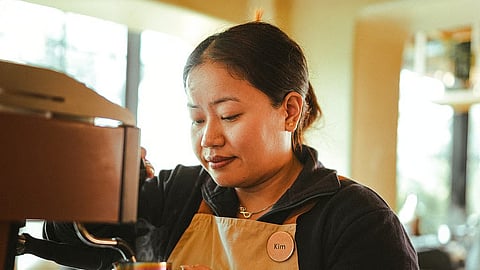
- LIFESTYLE
- FASHION
- FOOD
- ENTERTAINMENT
- EVENTS
- CULTURE
- VIDEOS
- WEB STORIES
- GALLERIES
- GADGETS
- CAR & BIKE
- SOCIETY
- TRAVEL
- NORTH EAST
- INDULGE CONNECT

What is home, really? Is it the place we’re raised in — the familiar streets, the memories, the smells that linger long after we’ve left? Or is it the place that adopts us, the one we carve out for ourselves as adults, brick by brick, experience by experience? It’s a question that’s followed me around ever since I moved out of my parents' house and began building a life of my own in a different city.
I often think of Dehradun and Mumbai, the cities that cradled my childhood and early adulthood — places I was fortunate enough to call home. But strangely, Delhi too has begun to feel like it belongs to me, or perhaps, like I belong to it. Even though I fought that feeling for the longest time.
The thought resurfaced recently at a loud, chaotic party. I’d slipped away to a quiet corner — as I often do — content to sit alone with my thoughts, observing the swirl of people and music around me. It was there I noticed her. A girl sitting beside me, equally detached, equally lost in her own head. She had that familiar glazed look — half-zoned out of the crowd, half-basking in the safety of her solitude.
I recognised her instantly. She works at a café I frequent — OMO Café in Gurugram — standing behind the coffee counter with an air of quiet authority. Her name’s Manbiakkim, though everyone calls her Kim. Twenty-eight, from Manipur, chief barista, and, interestingly enough, a bit of an Instagram sensation thanks to her funny coffee reels. Which is why her reserved demeanour at the party surprised me.
I struck up a conversation, curious. It turns out, she’s walked quite the winding road — dabbling in different careers before stumbling upon her true calling behind a coffee machine. What began as a chance job at a small office café has now flourished into a career at OMO, where she brews some of the best coffee in NCR — including Ngarum coffee, a rare single-origin, nano-lot coffee from Nagaland.
“I don’t know how to do coffee art,” she laughed, smirking. “But I do know how to make coffee that keeps people coming back.” I liked that quiet confidence.
Naturally, I asked her where she was from. Manipur, she replied. I asked if she missed it, if she’d been back recently.
“But this is home now,” she said, without hesitation, the hint of a smile on her lips.
I understood the sentiment all too well, yet I couldn’t help but press a little more. What made her so quick to claim Delhi as home? To speak of it almost as though her origins had been boxed away?
“This is the place that shaped me into who I am,” she explained simply. “Independent. Confident. Manipur is where I was born… but it’s here that I feel most alive.”
Fair enough. We let the conversation slip into a comfortable silence after that — two women, quietly thinking, perhaps unknowingly connected by our tangled relationships with the idea of ‘home’.
A plate of steaming pakoras arrived at our table a little while later. I barely registered them when Kim chuckled and said, “You know… what you call pakora here is so different to what we call pakora back home.”
Intrigued, I asked her to explain. Her face lit up — that unmistakable glimmer of nostalgia breaking through her cool exterior. She told me about the pakoras in Manipur — fried dumplings, crisp on the outside, soft within, but unlike the dry, crunchy snacks we pass around at Delhi parties. Back home, they’re served in a tangy tomato gravy, sometimes alongside rice.
It was in that moment that the conversation softened. She began telling me more about Manipur — the food, the flavours, the sensory details that time can never quite erase. She confessed that while she loves her life here, the food from home is what she misses most.
I understood. Isn’t that always the way? We carry childhood with us in fragments — the comfort of food, the smells of the kitchen, the memories we’re too protective of to let reality interfere.
Home isn’t always a fixed location on a map. Sometimes, it’s a patchwork of places — the one that made you, and the one that’s still shaping you.